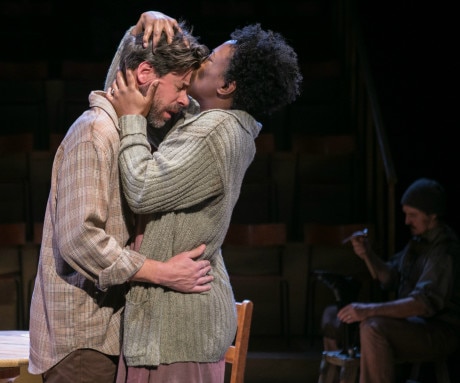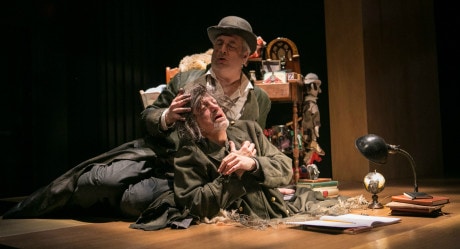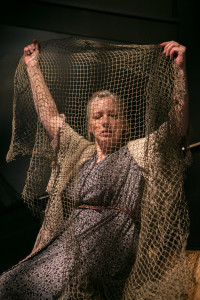When I attended the reading of Falling Out of Time at the Page-to-Stage Festival last fall, I wondered how on earth this poetic drama—half fairy tale, half allegory–could ever be mounted on a stage.
The answer, for all to see, is now on view at Theater J. It’s a visually stunning production, one which transforms the entire Goldman Theate into a single set, turning both the audience and the aisles into extensions of the stage.
The set is in fact one of the things I admired most about this stage adaptation of David Grossman’s lyrical novel, which portrays the journey of grief-stricken parents following the death of a child.

In the play, a grieving father, known as Man (played by Joseph Wycoff) leaves his wife (Erika Rose), to find the land of the dead and speak to his son one last time. While his wife watches from the town belfry, the Man climbs higher and higher, gradually joined by a motley parade of other mourning parents. Like Chaucer’s pilgrims, they have many tales to tell.
The pilgrims—each of whom has lost a child–are scattered throughout the theater as the play begins. Some are mending nets, others scribble in notebooks or hammer new soles onto shoes. Most absurd is one who is visible only from the waist up, being half-buried in a hole.
Set Designer Misha Kachman has managed to create an entire village-of-the-mind—along with the hills around it—within the steep confines of Theater J’s auditorium. (The night I was there, one couple, trying to find a shortcut to their seats, actually tried to climb over one of the actors!)
Working with Stage Manager Kate Kilbane and Prop Designer Andrea Moore, Kachman—who also produced the wonderful set for Olney’s Marjorie Prime—has invented a strangely surreal world. At the rear of the stage, a bank of seats looms high above the actors. Ticket holders who choose those seats become a kind of Greek chorus, silent participants in the drama.
The set itself is full of the artifacts of lost childhood. Props include empty cradles and birthing pans, cast off dolls, arithmetic problems scrawled on a board and the empty pages of books.
The few light moments in this otherwise very dark play are the gift of a handful of actors, Michael Russotto principal among them.

Russotto—who has dazzled audiences throughout the DC Metro area, most recently as Merv in Theater J’s The Sisters Rosensweig, and most notably as the Director in The Letters at MetroStage—is The Chronicler, or storyteller of record.
Not surprisingly, this storyteller is a former court jester, ordered by his master, the Duke, to record every act of the villagers, and especially of those who embark on the journey to the dead.
Another remarkable role is that of the Centaur, who is brilliantly portrayed by Edward Christian, also seen earlier this season in The Sisters Rosensweig. With matted hair and rags for clothing, he is stuck in the hole in the ground that he has dug for himself. Unable to write since the loss of a child 13 years earlier, his is the ultimate case of writer’s block.
The Midwife, mourning her own dead toddler, is played with vigor by Nora Achrati, who forces her cobbler husband (Rafael Untalan) to spit up the nails he has swallowed, which at least frees him to join her on the journey.
Leo Erickson plays the Math Teacher, an elderly professor whose son ‘accidentally’ killed himself 26 years earlier. At one point, Erickson—who recently lit up the stage in Bad Dogs at Olney—joins hands with the Chronicler and dances a jig. It is a rare moment of joy and hope.
Lording it, literally, over all of them—yet virtually unnoticed at the beginning, since he is in the very last row of the bleachers mounted at the rear of the stage—is the Duke.
As ruler of this mythical land, his Highness—played with Shakespearean majesty by John Lescault—has ordered his followers to hide their grief. The Chronicler is actually his spy, who talks of enjoying “a titillating share of someone else’s hell.”
The Chronicler’s Wife, a recent Helen Hayes Award winner in the lead actress category, is played by Nanna Ingvarsson. She spends her time mending fishnets and mourning a daughter who was drowned.
Mark and Emma Jaster are the father-daughter team responsible for the strong element of movement in the play. Using equal doses of choreography and mime—which the elder Jaster learned from Marcel Marceau himself—the two orchestrate the journey in a way that has mixed results.
Sound Designer Eric Shimelonis has created an odd medley of noise, ranging from minor instrumental notes to piercing screams. His most spectacular achievement—shared with Lighting Designer Colin K. Bills—is an Apocalyptic scene that may have worked better in its inception than it does on stage.
Similarly, Costume Designer Ivania Stack, who creates the most wonderful Medieval-style garments for the earlier segments of the story, then switches to body suits depicting arteries and veins.
Other lapses include having the actors walk across the middle rows of the theater as they circle around. The concept is fine. Except that the actors, probably afraid of blocking the audience’s view, abruptly break out of character. They charge briskly across the rows, completely destroying the illusion of downcast people, trudging along in sorrow. If they crossed at the back of the theater, instead of the middle, they could preserve that illusion and stay in the role.

Derek Goldman, who adapted the play from Jessica Cohen’s English translation of Grossman’s 2014 novel, has directed it with great care. An award-winning playwright, producer, and director, he is a veteran of Theater J and has many international successes to his name.
In a way, Falling Out of Time is a meditation on mourning. But it is not political or ideological, as some might think.
Taking on the risk of producing what is essentially a metaphysical play is a difficult trick. It involves sorcery—the kind of non-literal approach that Samuel Beckett (and Shakespeare, T. S. Eliot, and Dylan Thomas, among others) understood—and that few today can master.
Falling Out of Time is an interesting addition to the current local theatre season. I look forward to reading reactions from other audience members.
Running Time: 85 minutes, with no intermission. There is stage seating available.
Falling Out of Time plays through April 17, 2016 at Theater J – in the Washington District of Columbia Jewish Community Center – 1529 16th Street NW, in Washington DC. For tickets, call the box office at (202) 777-3210, or purchase them online.
LINK:
Magic Time! ‘Falling Out of Time’ at Theater J in Verse by John Stoltenberg.






Ravelle —
Thank you very much. I saw it this past Sunday and felt it could have been two or three separate plays. And you certainly provided a better explanation than was apparent to me.
It was not clear, at least to me, that all the adults in the play — other than the couple — had lost a child. And while the midwife is mourning a lost child, a line she spoke at the beginning of the play did not make clear that it was her child. It sounded like it was someone else’s.
As my colleague David Sobelsohn, the Footlights founder, said to me afterwards “I would not recommend this play to someone who has lost a child.” I found that while much of the acting was stellar, especially by the Centaur, the play was confusing enough that I would not recommend it to anyone who has lost a loved one, child or adult.
Mark Gruenberg
Dear Mark,
Forgive me for the late response, but I just noticed this today! Mea culpa, and thank you–and David–for your comments.
It’s very interesting to me to learn that it was not clear, from the play, that every pilgrim was a grieving parent. Obviously, I had an advantage, in that I attended the staged reading, in September, in which each of the participants spoke in detail of the death of his or her child.
As a result, I knew things that were not obvious in the final production that we saw.
I agree entirely with you and David about not recommending it to anyone who has experienced a loss. As my DCMTA colleague, David Siegel, wrote a day or two afterward, seeing the play was like criticizing a shiva. It’s an intrusion on a very personal kind of grief, with no solace.
Thank you again for your note. I look forward to talking to you about this at a future Footlights meeting, or at another production.